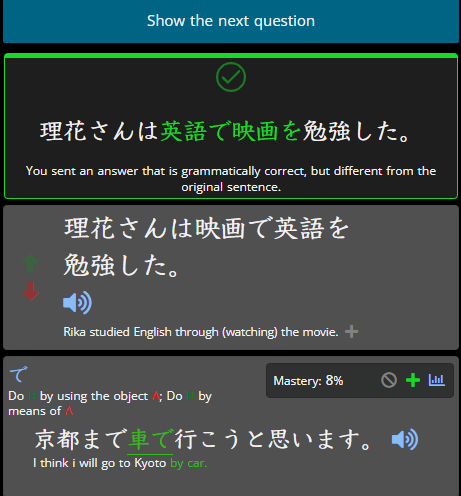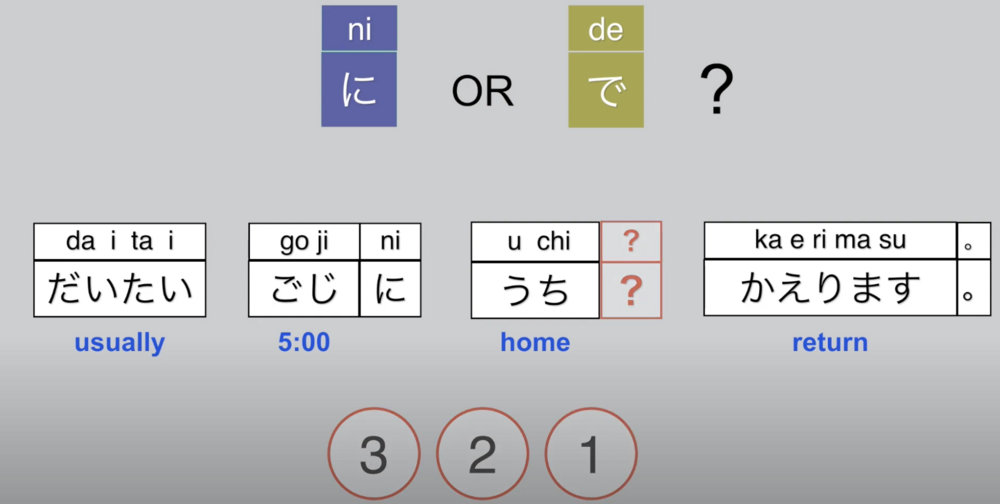At A; in A
Shows the location A that an action/event takes place.
- At A; in A Shows the location A that an action/event takes place.
- For A; in A (shows a length or amount of time)
- Do B by using the object A; Do B by means of A
- Shows the material A that something is made of/composed of
- Because of A; Due to A
- Used after nouns/な-adjectives to link a list of adjectives and/or nouns

今日は店でVRの体験ができた!
I got to try VR at the store today!
38
日本の温泉で混浴を為るのが私の夢です。
My dream is to mingle at a mixed-gender Japanese onsen.
3
30
巴里で彼女とキスを為ました。
I kissed my girlfriend in Paris.
0
39
夏休みの時、コンビニで働きました。
During summer vacation, I worked at a convenience store.
0
20
近所のスーパーで懐かしい友達に会いました。
I met a dear friend of mine at a supermarket nearby.
0
11
東京の渋谷でスカウト為れました。
I was scouted in Shibuya, Tokyo.
0
14
ここで、一発ギャグを為たいと思います!
I'd like to do a joke now (here)!
0
12
彼処で私たちはお喋りに夢中になって居ました。
We became engrossed in our conversation over there.
0
2
世界で一番小さい国は何処ですか。
Where is the smallest country in the world?
0
9
iPadをイーベイで売りました。
I sold my iPod on eBay.
0
21
大抵家で勉強します。
I usually study at home.
0
29
近くの公園で写真を撮りました。
I took pictures at the park nearby.
0
20
大学の中の映画館で良く映画を見ます。
I often go see movies at the movie theatre in the university.
0
7
大抵何処で洋服を買いますか。
Where do you usually shop for (Western) clothes?
0
54
大学で初めて日本語を勉強しました。
I started studying Japanese in college.
1
2
家の外で、母はガーデニングを為て居ます。
My mother is gardening outside.
0
6
学校で英語を勉強する。
I study English at school.
0
24
此処で話を為ないで下さい。
Please do not talk here.
0
5
彼は玄関で滑りました。
He slipped at the entrance.
0
6
夕べは家で休みました。
I relaxed at home last night.
0
4
途中で雨が降りました。
Rain fell on the way there.
0
12
いいえ、此処で食べます。
No, I'll be eating here.
0
11
公園で友達と歩きました。
I walked with my friends at the park.
0
2
試合で練習の成果を発揮出来なかったのは残念極まりない。
It was extremely unfortunate to not be able to show the results of our practicing at the match.
0
5
店で何を買いましたか?
What did you buy at the store?
0
6
家内は図書館で働いて居ます。
My wife works at the library.
0
5
実家では毎年梅を漬ける。
We/they pickle plums at my parent's house each year.
0
5
家でパーティーを為ました。
I had a party at my house.
0
45
車でラジオを聞く。
I listen to the radio in the car.
0
14
兄は学校で働きました。
My older brother worked at a school.
0
35
駅で母と食事する。
I'll eat with my mother at the station.
0
25
静かな部屋で眠る。
I sleep in a quiet room.
3
9
5つ星のホテルで働く。
I work at a five-star hotel.
0
8
父は新聞社で仕事を為て居ます。
Dad works at a newspaper company.
0
11
喫茶店で夫とお茶を飲んだ。
I had tea with my husband at the cafe.
0
Getting the sentences
Construction
(Elements in parentheses are optional.)
Basic Examples:
レストランで食べる (eat at a restaurant)
Notes
Shows where A takes place
Where this grammar is found
Grammar usage notes
Compare also to the use of に as a place marker (like in 日本に住む).
In this grammar pattern with places, in contrast with using に (where the verb is usually only passive or showing existence), when using で there needs to be an action taking place. For example レストランにいます (I am at the restaurant) vs レストランで食べています (I am eating at the restaurant).
- Use "に" for indicating where something is located.It is appropriate for situations where you want to describe the existence of an object or person in a specific place. Use "で" for indicating where an action is happening. It emphasizes the location in relation to an activity being performed.
While using 'で' he/she needs to be there first, to use に he/she needs to state that he/she will go at the place. To stay & To go( planned )
Questions/Discussion
Nothing posted yet!
For A; in A (shows a length or amount of time)
- At A; in A Shows the location A that an action/event takes place.
- For A; in A (shows a length or amount of time)
- Do B by using the object A; Do B by means of A
- Shows the material A that something is made of/composed of
- Because of A; Due to A
- Used after nouns/な-adjectives to link a list of adjectives and/or nouns
23
此の本を3日で読んで下さい。
Please read this book in three days.
0
14
1ヶ月で100冊以上本を読む人も居ます。
There are people who read over a hundred books a month.
2
12
此の宿題は後一時間で終える予定です。
I plan on finishing this homework in an hour.
0
12
蛍は地上に出て数日で死んで仕舞います。
Fireflies emerge into the open and die after a few days.
0
33
家から歩いて10分で会社に着きます。
Walking from home, I'll arrive at work in 10 minutes.
0
Getting the sentences
Construction
(Elements in parentheses are optional.)
Basic Examples:
4年間で (for 4 years)
Where this grammar is found
Grammar usage notes
When using a length of time, that's the duration of the action, not "after (period of time), the action will occur".
(incorrect) 五ヶ月でアメリカに行きます > I will go to America in 5 months.
(ok!) 五ヶ月でアメリカにいました. > I was in America for 5 months.
(incorrect) 一時間で出かけます > I will leave in an hour.
(correct) 一時間後(ご)でかけます> I will leave after an hour.
(incorrect) 五ヶ月でアメリカに行きます > I will go to America in 5 months.
(ok!) 五ヶ月でアメリカにいました. > I was in America for 5 months.
(incorrect) 一時間で出かけます > I will leave in an hour.
(correct) 一時間後(ご)でかけます> I will leave after an hour.
When used with time, it has the nuance of "over the course of (and no longer)"
e.g. 二年間で日本語を習った。It took (me) 2 years to learn Japanese.
e.g. 二年間で日本語を習った。It took (me) 2 years to learn Japanese.
This usage can be linked to につき (2). The particle で can be replaced by につき, if the relation between the basic amount and the associated amount is fixed. につき is more formal than で
この翻訳は一ページで二千円お払いします。
We will pay 2.000 yen per page for this translation.
この翻訳は一ページで二千円お払いします。
We will pay 2.000 yen per page for this translation.
Meaning can be used as within this period of time, as shown in the example.
Questions/Discussion
Nothing posted yet!
Do B by using the object A; Do B by means of A
- At A; in A Shows the location A that an action/event takes place.
- For A; in A (shows a length or amount of time)
- Do B by using the object A; Do B by means of A
- Shows the material A that something is made of/composed of
- Because of A; Due to A
- Used after nouns/な-adjectives to link a list of adjectives and/or nouns

自転車で買い物に行った。
I went shopping by bike.
48
箸で刺身を食べました。
I ate sashimi with chopsticks.
0
21
昨日、私は家のテレビで映画を見ました。
Yesterday、I saw a movie on TV at my house.
0
29
日本の友達と日本語で話したいです。
I want to talk to my Japanese friends using the Japanese language.
0
15
今日は車で送って貰いました。
I had (them) take me by car today.
0
-3
京都迄車で行こうと思います。
I'm thinking of going to Kyoto by car.
0
19
彼女とは日本語で会話為ます。
I talk to her in Japanese.
0
16
貴方のことは父の話で聞いて居ました。
I heard about you from talking with my father.
0
5
家族でゲームを為て楽しんだ。
We played games as a family and had fun.
0
9
雨の日以外は自転車で会社に行って居ます。
I go to the office by bicycle except on rainy days.
0
11
貴方と私が二人で歌います。
You and I will sing together.
0
16
車で海へ向かいましょう。
Let's head to the ocean by car.
0
15
電話で母に聞いた。
I asked my mother on the phone.
0
16
静かな声で話して下さい
Please speak in a quiet voice.
0
Getting the sentences
Construction
(Elements in parentheses are optional.)
Basic Examples:
電車で行く (go by train)
Where this grammar is found
Grammar usage notes
Nothing posted yet!
Questions/Discussion
How do you know which noun goes first?
Japanese is kinda like lego, you can build the sentence both ways: 車で京都まで行こうと思います。and 京都まで車で行こうと思います。
Both here are grammatically correct. The difference is that the closer to the start of the sentence something is the closer it is to the main topic of the discussion. If we put Kyoto first the main topic would be Kyoto, for example, I am talking about my plans for the trip, first we go to Kyoto, then to Osaka. To get to Kyoto, we will use the car.
Were I to put the 車 first this would be emphasised since the main topic of discussion would be the method of transportation. Let's say we have this context: If we go by train it's kinda expensive and we can't make any stops at some of the scenic spots. But if we go by car it's more convinient. So let's go by car to Kyoto.
Hope this helps a little.
Both here are grammatically correct. The difference is that the closer to the start of the sentence something is the closer it is to the main topic of the discussion. If we put Kyoto first the main topic would be Kyoto, for example, I am talking about my plans for the trip, first we go to Kyoto, then to Osaka. To get to Kyoto, we will use the car.
Were I to put the 車 first this would be emphasised since the main topic of discussion would be the method of transportation. Let's say we have this context: If we go by train it's kinda expensive and we can't make any stops at some of the scenic spots. But if we go by car it's more convinient. So let's go by car to Kyoto.
Hope this helps a little.
typically, Japanese starts with the furthest item out in the sentence and works it way in. Also, the verb is most always last. So, 京都 is the farthest out from the speaker, then the car, then the verbs (to go, I think).
Shows the material A that something is made of/composed of
- At A; in A Shows the location A that an action/event takes place.
- For A; in A (shows a length or amount of time)
- Do B by using the object A; Do B by means of A
- Shows the material A that something is made of/composed of
- Because of A; Due to A
- Used after nouns/な-adjectives to link a list of adjectives and/or nouns

此れは藁で作られて居ます。
This is made with straw.
17
山の湧き水で珈琲を淹れた。
I made coffee with mountain spring water.
0
12
彼のお寺は全て木で出来て居ます。
That temple is made completely of wood.
0
13
私は今晩豚肉で咖哩を作ります。
This evening I will make curry with pork.
0
26
林檎でジャムを作る。
I'll make jam out of apples.
0
Getting the sentences
Construction
(Elements in parentheses are optional.)
Basic Examples:
木で出来た (made of wood)
Where this grammar is found
Grammar usage notes
で is used when the material something is made of is obvious. When the materials are not obvious, から is used instead.
When the statement is about something specific, the verb form できている is used, whereas for generic statements できる is used.
E.g.
その箱は木でできている。 This box is made of wood.
剣は鋼でできる。 Swords are made of steel.
紙は木からできる。 Paper is made from wood.
このワインはカシスからできている。 This wine is made from black currant.
When the statement is about something specific, the verb form できている is used, whereas for generic statements できる is used.
E.g.
その箱は木でできている。 This box is made of wood.
剣は鋼でできる。 Swords are made of steel.
紙は木からできる。 Paper is made from wood.
このワインはカシスからできている。 This wine is made from black currant.
Questions/Discussion
Because of A; Due to A
- At A; in A Shows the location A that an action/event takes place.
- For A; in A (shows a length or amount of time)
- Do B by using the object A; Do B by means of A
- Shows the material A that something is made of/composed of
- Because of A; Due to A
- Used after nouns/な-adjectives to link a list of adjectives and/or nouns
13
済みません、雪で電車が遅れました。
Sorry, the train was late because of the snow.
0
14
今日は夏祭りで花火が上がる乃だ。
Today, fireworks will be set off because of the summer festival.
0
12
私は忙しくて行けない。
I am too busy to go.
0
9
戦争で家族を無くしました。
I lost family in the war.
0
Getting the sentences
Construction
(Elements in parentheses are optional.)
Basic Examples:
雪で (because of snow)
Basic Examples:
不潔で (because (it's) unhygenic)
Basic Examples:
忙しくて (because (I'm) busy)
Where this grammar is found
Grammar usage notes
Nothing posted yet!
Questions/Discussion
Nothing posted yet!
Used after nouns/な-adjectives to link a list of adjectives and/or nouns
- At A; in A Shows the location A that an action/event takes place.
- For A; in A (shows a length or amount of time)
- Do B by using the object A; Do B by means of A
- Shows the material A that something is made of/composed of
- Because of A; Due to A
- Used after nouns/な-adjectives to link a list of adjectives and/or nouns
15
彼は健康で丈夫だ。
He is strong and healthy.
0
14
山田さんは親切で美人だ。
Ms. Yamada is a kind and beautiful person.
0
18
街の外れに有る教会は壮大で素晴らしい。
The church in the outskirts of town is grand and wonderful.
0
14
パレードが始まると街は賑やかで華やかに成る!
When the parade starts the streets become lively and spectacular!
0
7
屋根に行く階段は狭くて急で暗いです。
The staircase leading to the rooftop is narrow, steep, and dark.
0
Getting the sentences
Construction
(Elements in parentheses are optional.)
Basic Examples:
奇麗で広い (clean and wide)
Where this grammar is found
Grammar usage notes
Nothing posted yet!
Questions/Discussion
Nothing posted yet!

 I don't want to make new topics needlesly.
I don't want to make new topics needlesly.